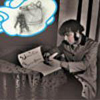 Both the Greek inventor Daedalus and this Southern Californian share similar fates: they came up with something great that went tragically awry. This debut Plug Research full-lengther opens with a strong prelude: a simple, yet elegant combination of samples and original melodies, swirled together in a serene lullaby.
Both the Greek inventor Daedalus and this Southern Californian share similar fates: they came up with something great that went tragically awry. This debut Plug Research full-lengther opens with a strong prelude: a simple, yet elegant combination of samples and original melodies, swirled together in a serene lullaby.
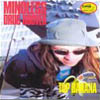 The debut release from Matt Hayden as Mindless Drug Hoover is a strangerelease from the more electronically-minded Deviant Records. Makingcomedy albums is a dangerous business, but Hayden's years of buskingmust have given him time to perfect these comic masterpieces. 'TopBanana' is a one-man-and-his-guitar affair, but the music is just thedelivery mechanism for his tales of smoking grass, being poor and evena love song (addressed to dried fruit on the glorious "Prune": "prune,oh prune/ you're a beautiful fruit, not just a laxative..").
The debut release from Matt Hayden as Mindless Drug Hoover is a strangerelease from the more electronically-minded Deviant Records. Makingcomedy albums is a dangerous business, but Hayden's years of buskingmust have given him time to perfect these comic masterpieces. 'TopBanana' is a one-man-and-his-guitar affair, but the music is just thedelivery mechanism for his tales of smoking grass, being poor and evena love song (addressed to dried fruit on the glorious "Prune": "prune,oh prune/ you're a beautiful fruit, not just a laxative.."). Despite the fact he recorded it all over one weekend (probably in the bathroom of some English pub), he's actually pretty crafty when it comes to making a catchy hum-along tune. You know what to expect with song titles like "Pancreas," "Fag stealer," and the subtle "Fuck off." With over 20 tracks in 40 minutes, the novelties never overstay their welcome. The tracks are cheap and shambolic— and genuinely hilarious. Also included is a jazzified remix of the "The Reefer Song," by The Orb.
samples:
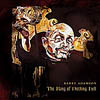 Who else but Barry Adamson to bring blaxploitation soundtracks into the 21st Century? As with the previous album, 1998's 'As above, So below', these songs are predominantly vocal based, albeit steeped in familiar film noir trappings. For in Mr. Adamson's Murky World, Cinema is King. His fictional frames are backed with a deftly orchestrated mixture of genres, including samples of badass brethren like Ike Turner, Cypress Hill and John Coltrane. Concerning the fiery, fun funk of opener "Cinematic Soul," Adamson proudly declares, "this is the stone groove I've been dying to rock with all my life." Indeed! Even his enthusiastic young son can't resist joining in 'cause, after all, "what is a song if you can't sing along?" "Whispering Streets" follows suit with more dramatic funkiness as Adamson unconvincingly pleads, "I don't even know how the gun got in my hand." In the dreamy, strings soaked '70s soul styling of "Black Amour," he becomes the slicker than Shaft character "Satisfaction Jackson." SJ confesses, "I want you, I need you, I love you," nicely enough, but then adamantly insists, "hold my freaky hand." "Twisted Smile" is low and slow, hazy and lazy as the, "everyone is everyone," line loops in epilogue. Of the three (essentially) instrumentals, "Le Matin Des Noire," (Archie Shepp) is my fave. For over ten minutes an organ-flecked vibes groove vamps into the background as the hustle and bustle of Parisian streets becomes the foreground. "That Fool Was Me" sees Adamson diversifying his discography even further as horns and harmonica add Dixieland dynamics. Sweetly singing, "something about you baby and they all agree," Adamson then admits "only a fool would leave you and that fool was me". For the climax of the duet finale, "Cold Comfort," an inquisitive refrain of, "sugar babe?" is overpowered by mighty drum rolls and orchestral curtain call. Damn. Damn! Just another highly cinematic masterpiece, no sweat. Barry Adamson, the coolest motherfucker on the planet? Probably. 'The King of Nothing Hill' my album of the year? Probably. Check barryadamson.com for forthcoming European tour dates and other goodies.
Who else but Barry Adamson to bring blaxploitation soundtracks into the 21st Century? As with the previous album, 1998's 'As above, So below', these songs are predominantly vocal based, albeit steeped in familiar film noir trappings. For in Mr. Adamson's Murky World, Cinema is King. His fictional frames are backed with a deftly orchestrated mixture of genres, including samples of badass brethren like Ike Turner, Cypress Hill and John Coltrane. Concerning the fiery, fun funk of opener "Cinematic Soul," Adamson proudly declares, "this is the stone groove I've been dying to rock with all my life." Indeed! Even his enthusiastic young son can't resist joining in 'cause, after all, "what is a song if you can't sing along?" "Whispering Streets" follows suit with more dramatic funkiness as Adamson unconvincingly pleads, "I don't even know how the gun got in my hand." In the dreamy, strings soaked '70s soul styling of "Black Amour," he becomes the slicker than Shaft character "Satisfaction Jackson." SJ confesses, "I want you, I need you, I love you," nicely enough, but then adamantly insists, "hold my freaky hand." "Twisted Smile" is low and slow, hazy and lazy as the, "everyone is everyone," line loops in epilogue. Of the three (essentially) instrumentals, "Le Matin Des Noire," (Archie Shepp) is my fave. For over ten minutes an organ-flecked vibes groove vamps into the background as the hustle and bustle of Parisian streets becomes the foreground. "That Fool Was Me" sees Adamson diversifying his discography even further as horns and harmonica add Dixieland dynamics. Sweetly singing, "something about you baby and they all agree," Adamson then admits "only a fool would leave you and that fool was me". For the climax of the duet finale, "Cold Comfort," an inquisitive refrain of, "sugar babe?" is overpowered by mighty drum rolls and orchestral curtain call. Damn. Damn! Just another highly cinematic masterpiece, no sweat. Barry Adamson, the coolest motherfucker on the planet? Probably. 'The King of Nothing Hill' my album of the year? Probably. Check barryadamson.com for forthcoming European tour dates and other goodies.
samples:
It was inevitable that the children who grew up with Barney the Purple Dinosaur and Power Rangers would eventually start listening to music. This is the only explainable reason why flocks of kids love this group while a number of critics poo-poo them. I'm not saying these kids don't have taste, but maybe they just don't know that music like this has been done far better for years and years. Take the vocals of Frank Tovey and Richard Butler, add a dash of Ride, mix well with the Smiths pretending to be any generic Factory label B-list band and hire any old 1980s producer who's not done much in a while (but will get the critics scatching their chins) and voila, a debut album is ready for a press campaign! While Gareth Jones's take on the group's recordings clearly sound miles ahead of their first EPs and mediocre live performances, even the most talented producer is completely unable to accommodate for atrocious vocals and downright painful lyrics. There are moments of reflection, like on the heavily reverb-effected "NYC" or the up-close and intimate "The New" but most of it is brainless jangly guitar-based minor key dance music like songs like "Obstacle 1" or Joy Division riff-ripoffs like "Roland." To their credit, the group does play well together, despite having numerous moments of one-note playing, but even they will eventually get bored of that.
samples:
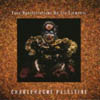 Some of Palestine's gorgeous drones are now transferred to CD and remastered by Lee Ranaldo and Thomas Koner for the Netherlands-based Barooni label. The two have done a great job too: the sound is crystal clear. This opens with 20 minutes of near static drones and tones in "Two-Fifths".
Some of Palestine's gorgeous drones are now transferred to CD and remastered by Lee Ranaldo and Thomas Koner for the Netherlands-based Barooni label. The two have done a great job too: the sound is crystal clear. This opens with 20 minutes of near static drones and tones in "Two-Fifths".
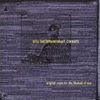 Finally Eric Bachmann releases an album under his own name. The former singer of Archers of Loaf and current mastermind behind Crooked Fingers composed "Short Careers," as the score for a finished, yet to be released, independent feature called "Ball of Wax." The film has a frightening, chilling story, and it seems Bachmann has set the mood just right. The music fits right in between Bachmann's arty leanings with his Barry Black recordings and the more somber balladry of Crooked Fingers. Violin, cello, upright bass, piano, and guitar intermingle playfully throughout, despite the ominous tones of the revealing track titles ("Aspirin vs Arsenic," "Nosebleed," "The Mysterious Death of Robert Tower"). Bachmann's music never really seemed all that cinematic, though his lyrics have always told stories that are longer than life, so it deems him a rather odd choice for film scoring, particularly since that means there will be little in the vocal department. Add to that the fact that the movie is about major league baseball, and it sounds like a disaster waiting to happen. Luckily, the film was completed when Bachmann composed and recorded the score, so he had great freedom and inspiration—more than some composers get. The music is quirky enough while still serving a purpose, though not as much when heard on its own. It will probably have more meaning after the listener views the film, but on its own only a few tracks are truly stand-alone works ("Vision and Execution," "Ty Cobb," "Good Morning Sleepyhead"). This album is proof positive, however, that the former leader of a popular indie college rock band can score movies, and I'm sure he'll get more work for it in the future.
Finally Eric Bachmann releases an album under his own name. The former singer of Archers of Loaf and current mastermind behind Crooked Fingers composed "Short Careers," as the score for a finished, yet to be released, independent feature called "Ball of Wax." The film has a frightening, chilling story, and it seems Bachmann has set the mood just right. The music fits right in between Bachmann's arty leanings with his Barry Black recordings and the more somber balladry of Crooked Fingers. Violin, cello, upright bass, piano, and guitar intermingle playfully throughout, despite the ominous tones of the revealing track titles ("Aspirin vs Arsenic," "Nosebleed," "The Mysterious Death of Robert Tower"). Bachmann's music never really seemed all that cinematic, though his lyrics have always told stories that are longer than life, so it deems him a rather odd choice for film scoring, particularly since that means there will be little in the vocal department. Add to that the fact that the movie is about major league baseball, and it sounds like a disaster waiting to happen. Luckily, the film was completed when Bachmann composed and recorded the score, so he had great freedom and inspiration—more than some composers get. The music is quirky enough while still serving a purpose, though not as much when heard on its own. It will probably have more meaning after the listener views the film, but on its own only a few tracks are truly stand-alone works ("Vision and Execution," "Ty Cobb," "Good Morning Sleepyhead"). This album is proof positive, however, that the former leader of a popular indie college rock band can score movies, and I'm sure he'll get more work for it in the future.
samples:
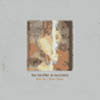 Take this album's title as a hint of what to expect. While watching a meteor shower and listening to music, the most exciting thing will, of course, be the meteor shower itself. Tara Jane and Dan are probably two of my favorite current singer/songwriters in the North American rock scene. I've seen both live on a number of occasions with their bands, Ida and Retsin, and once, just recently, in which each did fantastic solo performances. (Dan played on a number of instruments including a couple on harmonium and Tara Jane even did a Bruce Springsteen cover!) Needless to say, when I learned of the impending collaborative release, I was very excited. However, the two people whose voices and lyrics I cherish have ironically recorded an album of almost entirely instrumental songs— songs which disappointingly enough sound like they were explicitly built for vocals. With the exception of "Ooh la la..." (with French [?] vocals), there's a general void of any strong lead instrument. It almost makes me want to organize a letter-writing campaign for the duo to go back and record some lyrics on this record. This soundtrack for getting a midnight snack could easily bore the most sexually inactive vegan cafe patrons. Don't get me wrong, there's no love lost for these two, as they're each still incredible musicians and songwriters. However, if it's their signature sound that you've fallen in love with that you're anticipating, you'd be better off saving your money on this one.
Take this album's title as a hint of what to expect. While watching a meteor shower and listening to music, the most exciting thing will, of course, be the meteor shower itself. Tara Jane and Dan are probably two of my favorite current singer/songwriters in the North American rock scene. I've seen both live on a number of occasions with their bands, Ida and Retsin, and once, just recently, in which each did fantastic solo performances. (Dan played on a number of instruments including a couple on harmonium and Tara Jane even did a Bruce Springsteen cover!) Needless to say, when I learned of the impending collaborative release, I was very excited. However, the two people whose voices and lyrics I cherish have ironically recorded an album of almost entirely instrumental songs— songs which disappointingly enough sound like they were explicitly built for vocals. With the exception of "Ooh la la..." (with French [?] vocals), there's a general void of any strong lead instrument. It almost makes me want to organize a letter-writing campaign for the duo to go back and record some lyrics on this record. This soundtrack for getting a midnight snack could easily bore the most sexually inactive vegan cafe patrons. Don't get me wrong, there's no love lost for these two, as they're each still incredible musicians and songwriters. However, if it's their signature sound that you've fallen in love with that you're anticipating, you'd be better off saving your money on this one.
samples:
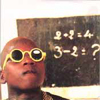 "Mali Music" is a collaboration between Blur's Damon Albarn and a groupof musicians from Mali, hence the title. A recent New York Times pieceabout the making of this album brought up the inevitable issue ofcultural piracy and whether Western artists can effectively play withAfrican musicians without somehow exploiting them or tainting thepurity of their music. I feel that setting strict boundaries like thatlimit the overall possibilities of musical creativity and to be honest,I wouldn't have bought an album called "Mali Music" if it didn't havethe added recognizable hook. And I'm glad I did buy it, for a number ofreasons. First of all, the music is really good and different from mostof the new stuff that I listen to; overall it has a much happier,organic feel to it than what's in my normal rotation. Also Albarn'sadditions help add texture, like the dubby bass he puts under the finaltrack, "Les Escrocs" and his minimal vocals throughout the album. Asidefrom his vocals in English on a couple tracks, mostly he stays out ofthe way and leaves it to the musicians from Mail to perform theirmusic. The Times article mentioned that he went to Mali armed only witha melodica in order to keep his role simple and unobtrusive. Hiscontributions are important though and help add a familiar structure tosongs that might otherwise become inaccessible. On the track "SunsetComing On" he expertly weaves his vocals into the instrumental withoutoverwhelming it. I enjoyed listening to the new (to me) instruments andfor most of the album they meshed well with the modern layers ofproduction underneath. Another thing that I liked about the album isthat the proceeds go to Oxfam, a hunger relief organization that helpedsponsor the collaboration. So even if you don't agree with my musicalassessment, at least you won't feel guilty about adding this CD to yourcollection.
"Mali Music" is a collaboration between Blur's Damon Albarn and a groupof musicians from Mali, hence the title. A recent New York Times pieceabout the making of this album brought up the inevitable issue ofcultural piracy and whether Western artists can effectively play withAfrican musicians without somehow exploiting them or tainting thepurity of their music. I feel that setting strict boundaries like thatlimit the overall possibilities of musical creativity and to be honest,I wouldn't have bought an album called "Mali Music" if it didn't havethe added recognizable hook. And I'm glad I did buy it, for a number ofreasons. First of all, the music is really good and different from mostof the new stuff that I listen to; overall it has a much happier,organic feel to it than what's in my normal rotation. Also Albarn'sadditions help add texture, like the dubby bass he puts under the finaltrack, "Les Escrocs" and his minimal vocals throughout the album. Asidefrom his vocals in English on a couple tracks, mostly he stays out ofthe way and leaves it to the musicians from Mail to perform theirmusic. The Times article mentioned that he went to Mali armed only witha melodica in order to keep his role simple and unobtrusive. Hiscontributions are important though and help add a familiar structure tosongs that might otherwise become inaccessible. On the track "SunsetComing On" he expertly weaves his vocals into the instrumental withoutoverwhelming it. I enjoyed listening to the new (to me) instruments andfor most of the album they meshed well with the modern layers ofproduction underneath. Another thing that I liked about the album isthat the proceeds go to Oxfam, a hunger relief organization that helpedsponsor the collaboration. So even if you don't agree with my musicalassessment, at least you won't feel guilty about adding this CD to yourcollection.
samples:
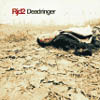 For some reason RJD2 is offended by comparisons to DJ Shadow. Iunderstand that DJs who make instrumental hip-hop don't want to beaccused of biting another DJ's style, but if two people have similarmusical interests and both create sample-based music, there is a goodchance that the result will sound similar. RJD2 favors organic drumbreaks and densely layered instrumental tracks, and does a good job ofvarying the flavor of his samples from song to song. If you have heardother Def Jux releases and can't quite get into the abrasive,synthesized, distortion-laden beats then this could be the one for you.
For some reason RJD2 is offended by comparisons to DJ Shadow. Iunderstand that DJs who make instrumental hip-hop don't want to beaccused of biting another DJ's style, but if two people have similarmusical interests and both create sample-based music, there is a goodchance that the result will sound similar. RJD2 favors organic drumbreaks and densely layered instrumental tracks, and does a good job ofvarying the flavor of his samples from song to song. If you have heardother Def Jux releases and can't quite get into the abrasive,synthesized, distortion-laden beats then this could be the one for you.The typical track on this album combines snippets of scratchy 70s soulvocals and instrumental samples like upright basslines to create asatisfyingly melodic whole. The album is somewhat of an antidote to theprogrammed, mechanical beats that have been dominating recent hip-hopDJ work. In other words, it's very un-Neptunes. Three of his trackshave MCs rhyming over them and each does a good job complimenting theDJ skills without overwhelming the complex instrumentals underneath.They also big up the DJs approach with lines like "RJ's thearchaeologist, diggin 'em up" . One of my favorite songs on the albumis "Ghostwriter," a perfect blending of layers of loops and vocals intoa head-nodding instrumental classic that never gets too repetitive. Ithink it was a great decision by Def Jux to pick up an artist likeRJD2, a talented DJ and master of the sampler who can produce musicthat offsets the label's darker tendencies...I guess he's not thatShadowy after all.
samples:
 P:ano started in 1999 in Vancouver as a collaboration between NickKrgovich and Larissa Loyva. Nick had been working on some songs whenthey started getting together to sing and play music, and they decidedto work on those songs by fleshing them out with more instruments.Later they added drummer Justin Kellam and Chris Harris, and the solidline-up was complete. "When It's Dark and It's Summer" is their debutrelease, recorded at Hive Studios and co-released on their new labelHive-Fi with Zum Media. As far as first works go, it's an incrediblyaccomplished batch of songs, with fully realized textures and melodies,that work towards a seemingly transcendent goal. This music is not justmeant to live in your ears for the short time you listen to it, it'sintended to invade the spaces behind. And it accomplishes that well,for the most part. P:ano's influences are clear, though anotherboy-girl dual vocal indie pop band to add to the mix could spell adisastrous future. However, the group also has enough originality uptheir sleeves to last. It's described as chamber pop, and that's prettyaccurate. The songs have classic pop structures, with hummable melodiesand understandable lyrics. They translate that simple structure withsparse arrangements that highlight the vocal power of the group.Krgovich and Loyva's voices blend well together with almost sickeninglysweet result, and the added flavors - strings, trumpet, clarinet - givethe songs that extra oomph. By the time you reach the penultimate track'Billions and Billions' (Carl Sagan reference, anyone?), whichstretches over seven-and-a-half minutes with an extended workout,you're hooked. A nice debut with real potential for the future.
P:ano started in 1999 in Vancouver as a collaboration between NickKrgovich and Larissa Loyva. Nick had been working on some songs whenthey started getting together to sing and play music, and they decidedto work on those songs by fleshing them out with more instruments.Later they added drummer Justin Kellam and Chris Harris, and the solidline-up was complete. "When It's Dark and It's Summer" is their debutrelease, recorded at Hive Studios and co-released on their new labelHive-Fi with Zum Media. As far as first works go, it's an incrediblyaccomplished batch of songs, with fully realized textures and melodies,that work towards a seemingly transcendent goal. This music is not justmeant to live in your ears for the short time you listen to it, it'sintended to invade the spaces behind. And it accomplishes that well,for the most part. P:ano's influences are clear, though anotherboy-girl dual vocal indie pop band to add to the mix could spell adisastrous future. However, the group also has enough originality uptheir sleeves to last. It's described as chamber pop, and that's prettyaccurate. The songs have classic pop structures, with hummable melodiesand understandable lyrics. They translate that simple structure withsparse arrangements that highlight the vocal power of the group.Krgovich and Loyva's voices blend well together with almost sickeninglysweet result, and the added flavors - strings, trumpet, clarinet - givethe songs that extra oomph. By the time you reach the penultimate track'Billions and Billions' (Carl Sagan reference, anyone?), whichstretches over seven-and-a-half minutes with an extended workout,you're hooked. A nice debut with real potential for the future.
samples:
 There's really a fine line between jazz-influenced electronic beats and sleepy nu-jazz telephone hold music and unfortunately, this album teeters a weee-bit too close to the undesirable.
There's really a fine line between jazz-influenced electronic beats and sleepy nu-jazz telephone hold music and unfortunately, this album teeters a weee-bit too close to the undesirable.
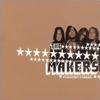 The Makers have been recording since 1993, and this album furtherexplores their recent glam-rock concept album tendencies. Listening toit sounds a lot like the soundtrack to 'Manhunter' or 'Band of theHand', or like the band is desperately trying to recreate the sound ofthat awful band in the club scenes of 'Lethal Weapon'. "StrangestParade" sounds like it wouldn't be out of place in 1985-1987, theheyday of big hair metal, but a time when just as many glam rock bandswere recording on a smaller scale than those that were successful. Theywere better than their big ticket major label counterparts. Lead singerMike Maker, or Michael Shelley, sounds like a bizarre cross of DannyElfman and Robert Smith, and the band is as full of angst as ever. Thealbum is sprinkled with segues in between the actual songs that tend todistract more than help. Bands trying to sound like the undergroundscenes of previous decades have merit, but only when they add somethingto the sound. The Makers try alright, but then the songs just aren'tall that compelling. Their last album, 'Rock Star God' was as much aconcept record as this one, but it seemed more polished and heartfelt."Parade" split into two parts, with one part seemingly moreintrospective and the other more balls to the wall. The phone ringingthat appears early on "Calling Elvis, John and Jesus" would be anoriginal thought if it hadn't been done 1800 times by other bands, orif the song was stronger; but the phone seems to plays a huge part inPart One of the record, as though a person were calling someone to helpthem or waiting by the phone for someone to call and save them. Thelyrics leave something to be desired, as well, as all good '80s hairbands' did ('Laughter then violence/music then silence'). Part Twoisn't as long as Part One, and it has some interesting textures, butbands like Cobra Verde just do this whole retro sound better,concetrating more on the essence in the songwriting than a seeminglyempty concept. This just doesn't grab me all that much.
The Makers have been recording since 1993, and this album furtherexplores their recent glam-rock concept album tendencies. Listening toit sounds a lot like the soundtrack to 'Manhunter' or 'Band of theHand', or like the band is desperately trying to recreate the sound ofthat awful band in the club scenes of 'Lethal Weapon'. "StrangestParade" sounds like it wouldn't be out of place in 1985-1987, theheyday of big hair metal, but a time when just as many glam rock bandswere recording on a smaller scale than those that were successful. Theywere better than their big ticket major label counterparts. Lead singerMike Maker, or Michael Shelley, sounds like a bizarre cross of DannyElfman and Robert Smith, and the band is as full of angst as ever. Thealbum is sprinkled with segues in between the actual songs that tend todistract more than help. Bands trying to sound like the undergroundscenes of previous decades have merit, but only when they add somethingto the sound. The Makers try alright, but then the songs just aren'tall that compelling. Their last album, 'Rock Star God' was as much aconcept record as this one, but it seemed more polished and heartfelt."Parade" split into two parts, with one part seemingly moreintrospective and the other more balls to the wall. The phone ringingthat appears early on "Calling Elvis, John and Jesus" would be anoriginal thought if it hadn't been done 1800 times by other bands, orif the song was stronger; but the phone seems to plays a huge part inPart One of the record, as though a person were calling someone to helpthem or waiting by the phone for someone to call and save them. Thelyrics leave something to be desired, as well, as all good '80s hairbands' did ('Laughter then violence/music then silence'). Part Twoisn't as long as Part One, and it has some interesting textures, butbands like Cobra Verde just do this whole retro sound better,concetrating more on the essence in the songwriting than a seeminglyempty concept. This just doesn't grab me all that much.
samples:
 It's hard to believe two years have passed since the incredible first 2xCD compilation from Morr Music surfaced (Putting the Morr Back in Morrissey). Two years later, a number of the bands featured have released marvelous albums on the Berlin-based Morr. This year's 2xCD collection of digital lullabies features a few acts who have become usual suspects from the Morr roster of champions as well as a handful of new faces: one disc of cover tunes, the other with all new material. Allegedly the story goes like this: Creation Records is dead and buried, Thomas Morr tried but failed to obtain the rights to reissue Slowdive's back catalogue, but that didn't stop him from successfully curating a fantastic collection of Slowdive cover tunes by a number of popular Morr artists and friends.
It's hard to believe two years have passed since the incredible first 2xCD compilation from Morr Music surfaced (Putting the Morr Back in Morrissey). Two years later, a number of the bands featured have released marvelous albums on the Berlin-based Morr. This year's 2xCD collection of digital lullabies features a few acts who have become usual suspects from the Morr roster of champions as well as a handful of new faces: one disc of cover tunes, the other with all new material. Allegedly the story goes like this: Creation Records is dead and buried, Thomas Morr tried but failed to obtain the rights to reissue Slowdive's back catalogue, but that didn't stop him from successfully curating a fantastic collection of Slowdive cover tunes by a number of popular Morr artists and friends.
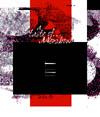 One cannot discuss a new Merzbow CD without mentioning how damn manyothers exist. No Merzbow CD can ever truly be "the new one", becausesome label is forever adding to the Merzbow publishing glut, newer onesarriving at a rate which confounds mere chronological hierarchy. It hasbecome so that the band name is like a brand name; one buys some moreMerzbow, rather than any specific album. Or one does not buy, which isincreasingly seeming like a fine idea. After all, it is not apparentthat Merzbow's Masami Akita actually has as many album-length ideas ashe does albums. Rather, he produces his sound until hismedia-determined time restraint runs out. I would be very surprised ifhe listens at all to what he produces these days, after or even duringthe process of recording, so satisfied he must be that he has filledanother 74 minutes with Merzbow.
One cannot discuss a new Merzbow CD without mentioning how damn manyothers exist. No Merzbow CD can ever truly be "the new one", becausesome label is forever adding to the Merzbow publishing glut, newer onesarriving at a rate which confounds mere chronological hierarchy. It hasbecome so that the band name is like a brand name; one buys some moreMerzbow, rather than any specific album. Or one does not buy, which isincreasingly seeming like a fine idea. After all, it is not apparentthat Merzbow's Masami Akita actually has as many album-length ideas ashe does albums. Rather, he produces his sound until hismedia-determined time restraint runs out. I would be very surprised ifhe listens at all to what he produces these days, after or even duringthe process of recording, so satisfied he must be that he has filledanother 74 minutes with Merzbow. Now, Mego is a label that I trust and respect. Not attached to anygenre or style, only a vague and loose allegiance to computer-createdmusic of some kind, I would expect them to demand more from Merzbow.That doesn't seem to be the case. On "A Taste of...", it sounds to meas if a couple of samples were looped for five minutes at a time, whilevarious filters were bloodlessly applied and removed. It's as if apattern, or perhaps an instruction booklet for some software, wasstrictly followed so that this specific result would emerge. There is atheme of Japanese cuisine presented in the artwork, but nothing withinthe music which resonates that theme. In fact, Japanese cuisine valuespresentation, freshness and detail, and this noise sounds as if no onemade it or was paying much attention to it or its ingredients at all.
I believe that noise can be musical—bands like Hijo Kaidan,Borbetomagus, Masonna, and especially CCCC, have produced works thathold up as albums which evidence some compositional thought andemotion, or even concentrated non-emotion. Pita has done so using acomputer; his "Get Out" is one of the most powerful computer-musicalbums that I can think of. Merzbow used to make albums that soundedwhole ("Antimonument", "Batz-Tau-Tai", "Material Action 2"), but sincethe 1990s has forfeited quality for quantity. If you've been wonderingwhy he is generally refered to as the "king" of Japanese noise music,you won't find out why by listening to "A Taste of...".
samples:
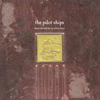 "There Should Be an Entry Here" is The Pilot Ships hard to find 1997debut, now re-released on BlueSanct, who released their sophomoreeffort in 2000. Listening to it again now, it hasn't lost its impactfive years on. These songs, created by members of the Stars of the Lidand Monroe Mustang, have lives of their own, as the pallette and feelof each differs from the rest on the record. What grabs you on one songmay not be the driving force of the next track. And where traditionalinstruments drive the proceedings, there are moments of sampled fieldrecordings and ambient noise that fill as much space as the guitars andvocals of other tracks. Birds chirp, a screen door shuts, and thelyrics lament about another blow when the subject is 'already brokendown' ('A Song by Your Campfire'). Listening to it now, everythingseems to be about these people getting to know each other as theycreate, knowing their stops and starts, so they can make musictogether. It's not less coherent than their later release, but it's notas adventurous, which just shows how much this band has grown and cangrow still. The album's epic closer, 'Looked Over (No Fun Reprise)', isas tedious as ever, though, with a bizarre guitar and keyboard openingwith vocal treatments, but dismantling five minutes in. Then a low humor muffled city recording lasts for another thirteen minutes beforepiano and dripping water join with spooky vocals to raise the hairs onyour neck. Still an affecting release, and only serves to whet theappetite for new music from this horribly underrated ensemble.
"There Should Be an Entry Here" is The Pilot Ships hard to find 1997debut, now re-released on BlueSanct, who released their sophomoreeffort in 2000. Listening to it again now, it hasn't lost its impactfive years on. These songs, created by members of the Stars of the Lidand Monroe Mustang, have lives of their own, as the pallette and feelof each differs from the rest on the record. What grabs you on one songmay not be the driving force of the next track. And where traditionalinstruments drive the proceedings, there are moments of sampled fieldrecordings and ambient noise that fill as much space as the guitars andvocals of other tracks. Birds chirp, a screen door shuts, and thelyrics lament about another blow when the subject is 'already brokendown' ('A Song by Your Campfire'). Listening to it now, everythingseems to be about these people getting to know each other as theycreate, knowing their stops and starts, so they can make musictogether. It's not less coherent than their later release, but it's notas adventurous, which just shows how much this band has grown and cangrow still. The album's epic closer, 'Looked Over (No Fun Reprise)', isas tedious as ever, though, with a bizarre guitar and keyboard openingwith vocal treatments, but dismantling five minutes in. Then a low humor muffled city recording lasts for another thirteen minutes beforepiano and dripping water join with spooky vocals to raise the hairs onyour neck. Still an affecting release, and only serves to whet theappetite for new music from this horribly underrated ensemble.
samples:
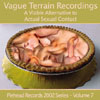 Oh yeah. Ohhhhhh yeah. I have to admit that I feel really dirty afterlistening to this recording constructed by and for the usage of gaypornography. However, this has got to be one of my favorite albums thisyear. Released on a limited edition CD-R from Piehead, this disc is theseventh Piehead's limited series. It has got to be one of the mostthumpingly deep, pounding, and implicitly explicit recordings Iprobably own in my collection. Songs are interspersed with audiosnippits of various movies, with some parts even lifted from whatappears to be conversations between directors and actors. If the duowho is widely known as the "A-Team of Electronica" has floated yourboat before, the rip roaring guitar riff on tracks like "Fist Power" orthe chunky lyrical bassline of "Son, That's a Battle You're Going toLose" may not stop at only blowing your hair back. With low-cool pieceslike "Son,..." and "The Rose Bud Opens", the duo have easilyout-grooved Boards of Canada with a super-charged virile take on thepopularized style which makes the Scottish Warp superstars look likeeunuchs. Unfortunately by the time you read this review, however, allcopies will most likely be gone.
Oh yeah. Ohhhhhh yeah. I have to admit that I feel really dirty afterlistening to this recording constructed by and for the usage of gaypornography. However, this has got to be one of my favorite albums thisyear. Released on a limited edition CD-R from Piehead, this disc is theseventh Piehead's limited series. It has got to be one of the mostthumpingly deep, pounding, and implicitly explicit recordings Iprobably own in my collection. Songs are interspersed with audiosnippits of various movies, with some parts even lifted from whatappears to be conversations between directors and actors. If the duowho is widely known as the "A-Team of Electronica" has floated yourboat before, the rip roaring guitar riff on tracks like "Fist Power" orthe chunky lyrical bassline of "Son, That's a Battle You're Going toLose" may not stop at only blowing your hair back. With low-cool pieceslike "Son,..." and "The Rose Bud Opens", the duo have easilyout-grooved Boards of Canada with a super-charged virile take on thepopularized style which makes the Scottish Warp superstars look likeeunuchs. Unfortunately by the time you read this review, however, allcopies will most likely be gone.
samples:
 Though his name has been placed firmly in the spotlight by a release onMEGO, Kevin Drumm has been plying his prepared guitar trade for someyears now, and has worked with many famous names, such as Jim O'Rourke,Christian Fennesz, Martin Tetreault, and Axel Doerner. My introductionto his music was the split 12" with Pita only last year, on Chicagolabel BOXmedia, and that juicy fragment made me keen to see how hewould respond to the ultimate form of Austrian patronage. The firsttrack opens with a few bleeps that could suggest everyday MEGO laptopmaterial, but soon moves to a constant, distorted analogue rasp: not atall a nod to the host label's stereotypical digital chaos.
Though his name has been placed firmly in the spotlight by a release onMEGO, Kevin Drumm has been plying his prepared guitar trade for someyears now, and has worked with many famous names, such as Jim O'Rourke,Christian Fennesz, Martin Tetreault, and Axel Doerner. My introductionto his music was the split 12" with Pita only last year, on Chicagolabel BOXmedia, and that juicy fragment made me keen to see how hewould respond to the ultimate form of Austrian patronage. The firsttrack opens with a few bleeps that could suggest everyday MEGO laptopmaterial, but soon moves to a constant, distorted analogue rasp: not atall a nod to the host label's stereotypical digital chaos.An inspection of the liner notes reveals he's stayed with a traditionalarsenal of guitar, mics, tapes, pedals and an analogue synth. Despitehim admitting to some "computer assistance", Drumm's offering is verymuch in the tradition of old-school power electronics or Japanesenoise, with only a few obvious signs of computer work to give it a morerecent feel. A more contemporary comparison might be to Oren Ambarchi'smore extreme processed guitar output.
As always with MEGO releases the packaging is notable, this time goingin for some kind of black metal joke, with a gothic "KD" inscribed ingold on black. And they managed to scare me more than any 80's Venompublicity photo by tinting the CD gold, the sight of which produced abrief but morbid flashback to the mid-90's terrors of owning fadeddiscs printed by PDO. Ultimately this black-clad music is more BoydRice than Varg Vikernes, but that, of course, is no bad thing.
samples:
Long before dictionaries included a musical description for the word'funk', a common definition was "to emit an offensive smell, to stink".Ironically, the most popular "funk" bands (Parliament, Ohio Players,Sly and the Family Stone, or James Brown) all had substantial recordingbudgets and crisp, clean production for the most part. The originatorsof funk (as a musical style) weren't that far off from the dictionary'sdefinition. The music was raw, produced on cheap equipment and foundits way to a number of 7" records in the late 1960s around the sametime as the flood of garage pop (see 'Nuggets' or 'Box of Trash'comps). While a number of NYC-based bands are jumping down thebandwagon of returning to garage pop ideals, NYC-based Soul FireRecords is heading down the road of original funk. Over the course ofthe last couple years, the label has been releasing a number of raw,yet powerful 7" singles in extremely limited quantities, which now arecompiled on these two collections.
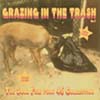 At first listen, it's rather deceptive, as you wonder if some of thesesongs truly date back thirty years. The first volume starts off withSoul Fire's third 7", two brief songs of looped gritty hooks by CalypsoKing & the Soul Investigators. It continues with the pimpin' soundsof Speedometer who bring to the collection a fierce horn section,wakka-wakka guitars and killer percussion. It isn't until the songsfrom Lee Fields & the Explorers that we actually finally hear asinger/band leader. While he shouts "Baby, I ain't James Brown" on "I'mthe Man" I must point out he does indeed squeak out an occasional JamesBrown line like "Give it up, turn it loose" and "I got soul." The tempodrops down for the two slow-riding numbers from Third Point and picksup again for a virile ending from The Soul Command, clearly masteredfrom terrible recordings. Volume One ends with a special bonus - "FastFunk Instrumental" by the Supersonics and a collection of breakbeatsprimed for sampling purposes.
At first listen, it's rather deceptive, as you wonder if some of thesesongs truly date back thirty years. The first volume starts off withSoul Fire's third 7", two brief songs of looped gritty hooks by CalypsoKing & the Soul Investigators. It continues with the pimpin' soundsof Speedometer who bring to the collection a fierce horn section,wakka-wakka guitars and killer percussion. It isn't until the songsfrom Lee Fields & the Explorers that we actually finally hear asinger/band leader. While he shouts "Baby, I ain't James Brown" on "I'mthe Man" I must point out he does indeed squeak out an occasional JamesBrown line like "Give it up, turn it loose" and "I got soul." The tempodrops down for the two slow-riding numbers from Third Point and picksup again for a virile ending from The Soul Command, clearly masteredfrom terrible recordings. Volume One ends with a special bonus - "FastFunk Instrumental" by the Supersonics and a collection of breakbeatsprimed for sampling purposes.
samples:
- JD & the Evil's Dynamite Band - Haaa-Sheesh
- Lee Fields & the Explorers - I'm the Man
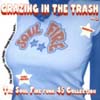 Volume two continues with seven more singles (14 tracks) and opens withthe flute and funk marriage by Bama & The Family. Lee Fields (whowas previously quoted as saying how he wasn't James Brown) pays a clearhomage to "Funky Drummer" with "Ain't it Funky Now" while theWhitefield Brothers play tribute to Funkadelic's "Super Stupid" with"In the Raw." The two songs from the Detroit Sex Machines adds a littlemore soul to the voice of the front man (and I swear this has got to bemastered from a slightly off-centered 45). There's no bonus beats onthis volume but the poorly-cut masters are enough to provide a mildamount of home-grown amusement. Unfortunately now, I'm hooked andcompelled to start buying their 7" single releases. Damnit!
Volume two continues with seven more singles (14 tracks) and opens withthe flute and funk marriage by Bama & The Family. Lee Fields (whowas previously quoted as saying how he wasn't James Brown) pays a clearhomage to "Funky Drummer" with "Ain't it Funky Now" while theWhitefield Brothers play tribute to Funkadelic's "Super Stupid" with"In the Raw." The two songs from the Detroit Sex Machines adds a littlemore soul to the voice of the front man (and I swear this has got to bemastered from a slightly off-centered 45). There's no bonus beats onthis volume but the poorly-cut masters are enough to provide a mildamount of home-grown amusement. Unfortunately now, I'm hooked andcompelled to start buying their 7" single releases. Damnit!
samples:
- Bama & the Family - Don't Think... Do
- The Whitefield Brothers - In the Raw
Lately, it seems as if the music of Jean-Luc Guionnet is everywhere.Though he has been active for many years, there seems to be a flood ofpublished Guionnet work recently. However, unlike other equallyprolific artists, Guionnet appears to have a diverse area of musicalinterest, backed up by solid ideas. Past albums have featured largegroup improvisation (with Hub/Bub), composed tape music (on the GroundFault label), field recordings (with his trio Afflux), and metallicsound-sculpture installation ("Synapses", on Selektion). His two latestCDs, it should come as no surprise, are very different from one anotherand are both worthwhile.
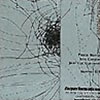 Pheromone is the trio of Guionnet, here playing metal, wood, contactmicrophones and some instruments I've never heard of (chifelia anyone?)with Eric Cordier on his usual hurdy-gurdy and Pascal Battus onprepared (he says "surrounded") guitar. The music was improvised liveto cassette on one day in May of 1998, and this CD retains the limiteddynamic range and compression inherent in that medium. This is a goodthing. The tape is saturated in such a way that the individualingredients are pretty much indistinguishable, especially during thebusiest sections. I happen to enjoy the sound of overloaded tape, sothere were many breathtaking passages for me. At one point in the firsttrack, something that sounds like a grunting beast wrestled withmetallic percussion under a blanket of smudge and feedback...wonderful! As electro-acoustic improv albums go, this one has grit anda fierceness that one does not encounter very often. My only complaintis that 'Disparture' might actually be too much of a good thing; at 72minutes long, I don't believe that the material has been sculpted intoan album. Perhaps a good way to listen to this would be intwenty-minute chunks, because I found myself craving some shape andclosure after about 40 minutes.
Pheromone is the trio of Guionnet, here playing metal, wood, contactmicrophones and some instruments I've never heard of (chifelia anyone?)with Eric Cordier on his usual hurdy-gurdy and Pascal Battus onprepared (he says "surrounded") guitar. The music was improvised liveto cassette on one day in May of 1998, and this CD retains the limiteddynamic range and compression inherent in that medium. This is a goodthing. The tape is saturated in such a way that the individualingredients are pretty much indistinguishable, especially during thebusiest sections. I happen to enjoy the sound of overloaded tape, sothere were many breathtaking passages for me. At one point in the firsttrack, something that sounds like a grunting beast wrestled withmetallic percussion under a blanket of smudge and feedback...wonderful! As electro-acoustic improv albums go, this one has grit anda fierceness that one does not encounter very often. My only complaintis that 'Disparture' might actually be too much of a good thing; at 72minutes long, I don't believe that the material has been sculpted intoan album. Perhaps a good way to listen to this would be intwenty-minute chunks, because I found myself craving some shape andclosure after about 40 minutes. 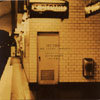 Another animal entirely is "Metro Pre Saint Gervais", recorded andperformed in the Paris train station of the same name. Englishviolinist Warburton (also a writer for the Wire and Signal to Noise)and the omnipresent Guionnet (here on alto sax) wandered around thetrain station with their instruments for an evening while Eric La Casaactively recorded the interactions between the duo and the station. Intruth, the subway station itself makes this a quartet, since itspeculiar gestures determine the nature of the sounds generated within.On this album, it can be heard interjecting bits of people'sconversation, as well as its own strange acoustics, implacable bellsand clangs, incidental noises and (of course) the occasional train insuch a way that it is playing exactly as much as the "players" are. Onetone seems to reoccur, echoing through the space as a sort of chorus tounite the piece's several sections. This odd tone is subtely quoted inWarburton and Guionnet's playing, which La Casa uses to underlineserendipitous moments (like when an escalator drone matches thesaxophone's pitch, or footsteps suggest a subtle rhythm, etc) intotense and concise compositions. La Casa is very concsious of the stereofield, as demonstrated in his pitting of violin against saxophone inopposing speakers, gradually pulled into the center just as a trainarrives to obliterate the moment. Both instumentalists play into theirenvironment, blending with and accentuating aspects of the foundacoustic space, rather than simply overlaying improv onto environmentalnoises, which would have been obvious and boring. There is a danger inthis kind of sound work that the subject matter might be so opaque thatit overshadows the music, but this trio seems to be aware of that. Theyhave created a pure listening experience, in which the elements add upto a complete and thoughtful whole.
Another animal entirely is "Metro Pre Saint Gervais", recorded andperformed in the Paris train station of the same name. Englishviolinist Warburton (also a writer for the Wire and Signal to Noise)and the omnipresent Guionnet (here on alto sax) wandered around thetrain station with their instruments for an evening while Eric La Casaactively recorded the interactions between the duo and the station. Intruth, the subway station itself makes this a quartet, since itspeculiar gestures determine the nature of the sounds generated within.On this album, it can be heard interjecting bits of people'sconversation, as well as its own strange acoustics, implacable bellsand clangs, incidental noises and (of course) the occasional train insuch a way that it is playing exactly as much as the "players" are. Onetone seems to reoccur, echoing through the space as a sort of chorus tounite the piece's several sections. This odd tone is subtely quoted inWarburton and Guionnet's playing, which La Casa uses to underlineserendipitous moments (like when an escalator drone matches thesaxophone's pitch, or footsteps suggest a subtle rhythm, etc) intotense and concise compositions. La Casa is very concsious of the stereofield, as demonstrated in his pitting of violin against saxophone inopposing speakers, gradually pulled into the center just as a trainarrives to obliterate the moment. Both instumentalists play into theirenvironment, blending with and accentuating aspects of the foundacoustic space, rather than simply overlaying improv onto environmentalnoises, which would have been obvious and boring. There is a danger inthis kind of sound work that the subject matter might be so opaque thatit overshadows the music, but this trio seems to be aware of that. Theyhave created a pure listening experience, in which the elements add upto a complete and thoughtful whole.
samples:
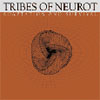 This side project of Neurosis has been releasing some of the bestexperimental music since their first album, 'Silver Blood Transmission'in 1995. This one has been several years in the making, and is"dedicated to and inspired by... and originally produced by insects"according to the insert.Disc One opens with the 2-minute "High Mobility", as a slow bass line is permeated with a shrill swirl of echoing bugs.Track 2, "Adaptability" sounds like an ant's aural perspective whenthousands of its brethren are hastily running around. These tracksremind me of what Mark Spybey puts out on Hafted Maul without theparticular toy which dominates each song. Unlike a lot of experimentalacts you can hear and follow what is going on. Nothing irritates memore than when you listen to a 10-minute track where you have to leaninto the speaker because it's turned all the way up and you 're notsure if you can hear anything. There is definitely something going onhere, like track 4 'Small Size' which starts off with an undulatingrushing flutter that runs throughout the entire track. Layered on topand underneath of that are beating hearts and steel cords being drugacross plastic grating. If you like layered music this is for you. Attimes during track 5, 'metamorphosis', I am reminded of the feel I getfrom Nurse With Wounds 'Swan Song' from 'A missing Sense'. That rushingback and forth of the same drone, though not nearly as intense in thisform. Only coming in at 33 minutes and 28 seconds isn't a whole lot ofmaterial, but it is a double CD. Disc two is all one track, clocking inat 34 minutes and 25 seconds which is odd, considering they are meantto be played together. I notice some of the same sounds in the firstfew minutes, but it is also a much more intense display. The same humcomes in and out through the whole track and there may even be a chorusof shrieking madness. There is no general song structure or percussionhere, just sounds, which appeals to many. I like listening to this discat work real loud and confusing everyone around me. They don't knowwhat they are hearing.
This side project of Neurosis has been releasing some of the bestexperimental music since their first album, 'Silver Blood Transmission'in 1995. This one has been several years in the making, and is"dedicated to and inspired by... and originally produced by insects"according to the insert.Disc One opens with the 2-minute "High Mobility", as a slow bass line is permeated with a shrill swirl of echoing bugs.Track 2, "Adaptability" sounds like an ant's aural perspective whenthousands of its brethren are hastily running around. These tracksremind me of what Mark Spybey puts out on Hafted Maul without theparticular toy which dominates each song. Unlike a lot of experimentalacts you can hear and follow what is going on. Nothing irritates memore than when you listen to a 10-minute track where you have to leaninto the speaker because it's turned all the way up and you 're notsure if you can hear anything. There is definitely something going onhere, like track 4 'Small Size' which starts off with an undulatingrushing flutter that runs throughout the entire track. Layered on topand underneath of that are beating hearts and steel cords being drugacross plastic grating. If you like layered music this is for you. Attimes during track 5, 'metamorphosis', I am reminded of the feel I getfrom Nurse With Wounds 'Swan Song' from 'A missing Sense'. That rushingback and forth of the same drone, though not nearly as intense in thisform. Only coming in at 33 minutes and 28 seconds isn't a whole lot ofmaterial, but it is a double CD. Disc two is all one track, clocking inat 34 minutes and 25 seconds which is odd, considering they are meantto be played together. I notice some of the same sounds in the firstfew minutes, but it is also a much more intense display. The same humcomes in and out through the whole track and there may even be a chorusof shrieking madness. There is no general song structure or percussionhere, just sounds, which appeals to many. I like listening to this discat work real loud and confusing everyone around me. They don't knowwhat they are hearing.



